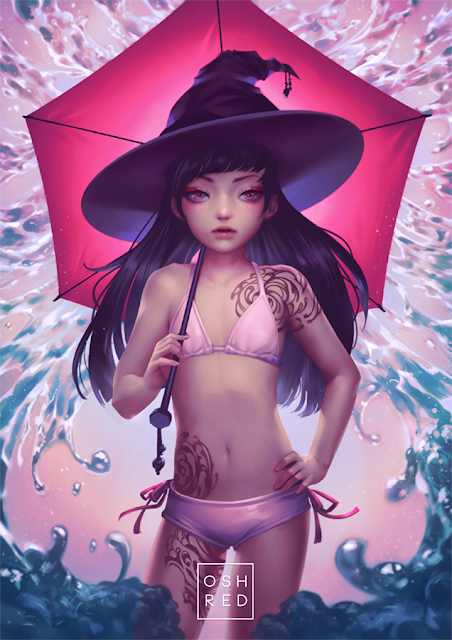Oshredart interview
1) Hi Oshred! Thanks for taking the time to do this! Can you give us a brief introduction to who you are and how long have you been working as an artist?
Hi Wesley, thanks for taking an interest in my work. My name is S. Red Amparo (most people call me Red) and I'm a freelance illustrator from the Philippines. It's hard to say precisely how long I've been working as an artist, because in a way I've been taking commissions since I was a teen; if you're asking how long I've more or less been able to support myself with illustration work, about 3 or 4 years.
2) When I came across your work I was completely blown away! You have an exceptional skill level for being so young! What kind of education background do you have?
Thanks for the kind words. I'm primarily self-motivated when it comes to my education as an artist; in other words, I'm mostly self-taught and learned a lot from books, youtube videos, and tutorials I found online. In 2016, I enrolled in a 1-year diploma course for digital illustration and concept art at 3dsense Media School in Singapore, which made up for a lot of gaps in my knowledge. Before that, I actually earned a BA in English, a 4-year course during which I studied creative writing and literature; there are a lot of overlaps between writing and the visual arts, so I don't think it was a waste even though I decided not to pursue writing professionally.
3)Speaking of skill what do you credit as being the number one contributor to you being able to create the awesome work you create? Was there any specific exercise such as master studies or something along those lines that helped you progress that you think is worth mentioning?
I don't think I can say my progress is due to any one technical skill or exercise; any exercise one learns about, I would recommend doing just to try it out. If there's any skill I would say is imperative for a fledgeling artist to develop, it would be the ability to think critically. I'm a huge proponent of applying the scientific method to learning about art: collect information about your field, the artists who work in it, compare and contrast their work with yours. Formulate a hypothesis as to how you might get closer to your ideal, conduct experiments on your art to test them out, and analyse the results; are you closer or further from your desired style/aesthetic/technical level? If so, how did you do it? If not, repeat the process. A lot of artists tend to create blindly, follow tutorials without questioning why, or parrot the works of others without understanding why or how they work well. When an artist is able to think more critically and apply this thinking to their practice, I believe their attempts will yield more satisfying results.
4) I see you do primarily cover art for (I assume) comics and books, how did you break into doing this kind of work? Did you just reach out to publishers directly with your work or do people approach you?
There was a time I sent out my resume to various publishers in an attempt to find cover work, but truly I found more work just by posting my work online, doing illustrations which *looked* like they could be cover work, and trying to build an audience with people who had the same interests. Eventually, an agent who saw potential in my work reached out to me, and currently he is the one who fetches projects for me and connects me with clients.
5) Continuing that question what kind of clients do you work for?
A majority of my clients are small, independent creatives; a lot of self-published authors, indie musicians, indie comic publishers, and comic book stores. I also get a lot of private commission work from people who are into tabletop roleplaying games (DnD, VtM), which also pays very well.
I love my job; I love being able to create covers for other creators and bring their ideas to life, coupled with my vision and aesthetic. I also love creating original, personal work. I feel as though no matter what, I will want to do both. My Patreon is a little bonus/add-on for people who enjoy my work and want to see more; I offer high resolution images of my art when available, frequent works in progress, the occasional video, as well as access to my discord server where they can get more insight into my work process and life as an artist.
7) For people trying to find their way in the illustration field to find work, what kind of advice do you have for them? Were there times when business was slow and when it was what did you do to keep yourself going?
I still experience these struggles, and I expect I will continue to. So far what I've done is to try everything (as much as possible without spreading myself too thin). I think it becomes necessary, especially as a freelancer, to explore every possible avenue for work, even if it seems like a dead end. I like to think of myself as an artist who gives most opportunities a good honest try. Speaking more practically, work always seemed to flow in whenever I made an honest effort to reach out to people with my art - that is, posting my art more frequently on social media and engaging with those who might enjoy it. It's just part of the business. :)
8) Any shoutouts? Where can people follow you online?
I try to be on as many platforms as I can, but you'll find that my twitter and instagram are the most active.








Comments
Post a Comment